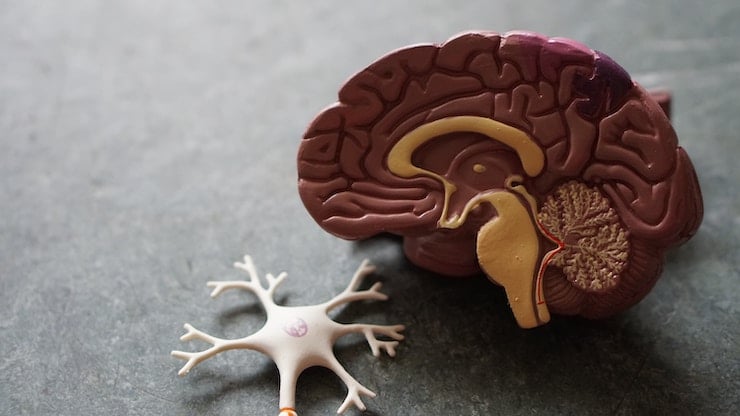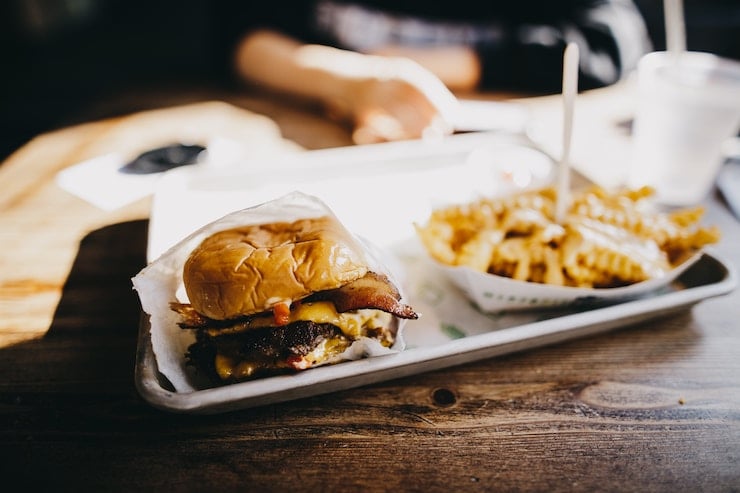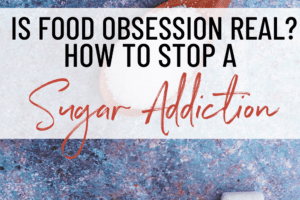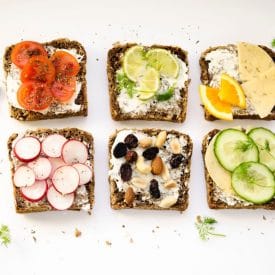We dive into the research to discuss sugar addiction and how to stop food addiction or obsession with food behaviours.
Woah. This is a big topic and let me tell you- it’s a heated one for sure. I’ve had so many specific questions about obsession with food and sugar addiction, I HAD to look into the evidence. I want to start by saying that I have a ton of empathy if you feel like you’re struggling with food obsession, or specifically sugar addiction. I know that a lot of you describe feeling out of control around certain foods and can only associate it with an addictive like experience, and that complete abstinence feels required to feel in control. I’m not discounting your lived experience- this is so real for so many of you. I want to give you some guidance and tools on this based on the literature.
What is Addiction?

According to the Society of Addiction Management, “addiction is a primary, chronic disease of brain reward, motivation, memory, and related circuitry”. Essentially, it’s a change in the brain that results in a person continuously seeking reward and relief by using a certain substance, such as drugs, or engaging in a specific behaviour, such as sex.
Addiction is diagnosed using the friendly mnemonic ‘ABCDE’:
- “Inability to consistently Abstain
- Impairment in Behavioural control
- Craving; or increased “hunger” for drugs or rewarding experiences;
- Diminished recognition of significant problems with one’s behaviours and interpersonal relationships; and
- A dysfunctional Emotional response.”
Furthermore, the DSM (Diagnostic and Statistical Manual of Mental Disorders) criteria for a substance abuse disorder also includes behaviours such as: spending a large amount of time finding and using the substance, inability to cut down despite trying to, and continuing to use the substance even though they and others know how harmful it is. Finally, addiction usually includes a cycle of relapse and remission.
What is Obsession with Food?
The theory of food obsession (aka food addiction) entails similar symptoms to that of drug abuse, such as loss of control and cravings for “problem foods”. It suggests that people with an obsession with food have an inability to abstain from certain foods, crave them, and cannot control their intake.
The term ‘food addiction’ can partially be attributed to the development of a tool called the “Yale Food Addiction Scale”. This scale is a self-reported tool measures addictive-like habits related to food. It has 35 questions about certain eating behaviours and is based off of the DSM criteria for substance addiction. It also asks if the person experiences significant distress related to food.
Once completed, answers that meet the criteria for 11 different addictive food behaviours are tallied. If the person has at least three of the addictive behaviours AND indicated they experience stress related to food, then they are diagnosed with a “food addiction”.
While the Yale Food Addiction Scale may be useful in some settings, it doesn’t tell us much. This scale is based on peoples lived experience, not actual data about addiction, so it really only reflects perception or feelings.
It also doesn’t include any questions that pertain to dieting or restriction. When someone is “diagnosed” with food addiction, they aren’t even screened for disordered eating behaviours. Despite the fact that research has shown time and time again that they are strongly related. That’s a problem. So we don’t actually know that it’s measuring anything different than an eating disorder.
Meanwhile, one study using the Yale Food Addiction Scale found that a “persistent desire or repeated and unsuccessful attempts to quit” a particular food was the only symptom of an obsession with food. This means that other characteristics of addiction weren’t common in relation to food.
Even if this official tool is not perfect, there is still a lot of reasons why this concept prevails. Lets look at the evidence.
Evidence Suggesting an Obsession with Food (Or Specifically Sugar Addiction) is Real
Dopamine Response to Sugar

Dopamine is one of the major neurochemicals released from the brain when someone does drugs. From smoking a cigarette to injecting heroin, dopamine levels rise. One of the big arguments for the idea of food as an addictive substance is that studies have shown a dopamine response from food that is similar to the brain’s dopamine response to drugs.
In a small human study, healthy volunteers were given either a tasty milkshake or a tasteless solution and their brains were analyzed. Researchers discovered that the tasty milkshake stimulated the release of dopamine at two different times. It was released when the food was first eaten and again once the food reached their stomach. This dopamine release occurs in the dorsal striatum part of the brain, and that same location of the brain releases dopamine during cocaine use.
A very famous 2005 study gave one group of rats a sugar solution for only 12 hours a day, one was given it twice, and another rat group was given a sugar solution ad libitum (meaning for all hours of the day whenever they wanted). Researchers looked at the rat’s brains and found that on the first day, both rat groups released dopamine. This is because dopamine is always released in response to a new novel food as a way to help keep tabs on it in case it turns out to be poison or something.
Interestingly, they found that the rats given sugar for only 12 hours of the day binged on that sugar. They also found their dopamine levels continued to increase over the course of a month as they eat progressively need to eat more and more each day. The other rat group given sugar all the time did not demonstrate binge like tendencies. I will talk more about later, and following day 1, their dopamine levels stabilized. In other words, the binging on sugar produced a similar dopamine pattern response as what we see when we take hard drugs.
Withdrawal Symptoms from Removal of Sugar
Another one of the reasons people believe sugar to be an addictive substance is thanks to the evidence on withdrawal symptoms. Evidence from rat studies has found that when animals were used to eating sugar and then that sugar was taken away, the rats exhibited signs of depression and anxiety. They even exhibited physical symptoms like a change in blood pressure and heart rate. When researchers looked at the brains of these rats experiencing withdrawal, they found that their dopamine levels dropped. This is also seen in individuals experiencing a withdrawal from drugs. They also noted a rise in the neurotransmitter, acetylcholine, which also tends to rise during withdrawal periods in individuals suffering from substance abuse.
Sugar vs Healthy Foods on Response
Finally, the other popular argument about why sugar is unique in its addictive qualities is from that 2005 study we already discussed. Another phase of the study aimed to determine if animals would become obsessed and overeat healthy foods the same way they do sugar. So they gave rats healthy foods for 12 hours in a day (aka intermittently) and found that they did not binge within the first hour and did not increase their intake over time. The opposite was found when they intermittently fed the animals sugar. There is the argument that there is something specifically in sugar that is producing a desire to binge.
That all sounds really convincing but let’s first consider that these studies are largely rodent based and we can also view this from the opposing side.
Arguments Against Food Obsession
Dopamine Response to Pleasure

In contrast a 2014 Neuroscience & Biobehavioral Reviews found no evidence to support the same brain reaction to sugar that is experienced from cocaine and did not have the same neural “hijacking” on the brain that cocaine does. A more accurate description is that the natural pleasure centers in the brain are fired when we eat and that this is a natural normal reaction but that drugs are actually hijacking these natural pathways.
At the same time, we also see that same dopamine response to positive, non-addictive behaviours and stimulus like music, humour, seeing a loved one, smiling, holding your baby etc. Arguably, music and humour aren’t addicting, and neither is smiling. They are, however, pleasurable – much like food. To call sugar or any food addictive would mean you also have to call cuddling your baby addictive or giving a loved one a gift addictive.
Normal Evolutionary Response
Evolutionary, it only makes sense for us to attain some pleasure from food. Otherwise we would not have enough drive to obtain it in dangerous circumstances and therefore, we probably wouldn’t survive. When it comes to sugar, which is glucose, our body and brain depend on it as they’re preferred source of fuel and energy. Furthermore, in the study I previously mentioned, researchers found that people had a harder time handling high sugar AND fat foods. This makes complete sense from an evolutionary perspective. Fat is the most calorie-dense macronutrient, meaning we get the most energy in the smallest amount. Sugar is immediately absorbed into the body and gives us fast energy. So, if the food is calorie-dense AND has immediate energy, our body is going to want to eat this over other foods.

Now, in periods of deprivation and starvation, our body works in overdrive to force us to eat. This can include sending extreme hunger cues that lead to a bingeing-like episode. While one may view this as “relapsing” or giving into one’s sugar “addiction”, it’s really just the body demonstrating a deep-rooted biological survival mechanism. This is in no way a “failure” to control withdrawal symptoms. What’s more, our body is very smart. It’s going to look for the best option available that involves little energy. What does that mean? It’s going to search for sugar, because it’s easily absorbed into the blood stream with little to no digestion required.
Result of Restriction

Back to that famous research on rats relating sugar to cocaine. Despite seeing a drug-like response in rat brains to sugar, researchers have found that this only occurred when the rats had previously been restricted from sugar. This means that when rats were able to have sugar when desired, their brains did not light up the same way as opioids. In fact, they responded to sugar like they would to any other type of food.
The authors say it beautifully: “Intermittent access is critical to the development of binging…this paradigm promotes a form of eating under uncertainty because food availability is unpredictable.”
This binging effect was also seen in the animal study I mentioned earlier with the binging rats. The rat group given sugar for only 12 hours binged when they finally got access, and over the 21 days, consistently increased their sugar intake with every binge. Rats given access to sugar whenever they wanted, did not binge, and their total sugar intake was significantly lower. There wasn’t the same desire to overeat the health foods. This suggests there may be something unique about sugar or sweet foods. This effect can be potentially mitigated by simply removing that novel or off limits experience. This is basically why I hate the idea of cheat days.
What About Human Studies?
But that’s just rats, so let’s also consider the effect in humans. In humans, research suggests that those who feel they have an obsession with food tend to have a long, complicated history with disordered eating and dieting. So, when we finally allow ourselves to eat a forbidden food, our brain naturally will get “excited” and cause us to feel out of control.
In fact, research has shown that when we go through long periods of restriction, our brains react differently to food cues. In one research study in a journal called Neuroimage, researchers found that those who restricted food had increased reaction in their brain to food cues. The researchers believe this may lead to greater desire to obtain these foods. Regions in their brain associated with “reward” were much more active as well, suggesting that these people view restricted foods as rewards. The result? They get more desire in eating the food, which may lead to overeating and less control.
If we can learn anything from diet culture, it’s that when we restrict food, we are very likely to binge on the “forbidden” food at some point. In our eyes, these foods are so novel, special, and restricted that eventually we crack and go overboard. Instead, if we were to enjoy foods in moderation and remove the negative labels, we’re more likely to stay in control and not go into a vicious cycle of eat, repent, restrict, repeat.
So Does Sugar Addiction or Food Obsession Actually Exist?
We really don’t know. Sugar addiction may or may not be technically real, but there’s no denying that it feels overwhelmingly real and I think that’s all that ultimately matters.
How to “Cure” an Obsession with Food

When a person is trying to recover from an addiction, it almost always involves abstaining from the substance or behaviour. For a food obsession, this would mean abstaining from “problem” foods such as those with sugar and fat. This is essentially a diet in disguise and can be detrimental to those suffering from disordered eating. In fact, it is likely going to exacerbate the binging behaviours as the evidence all suggests.
In fact, one study in the European Eating Disorders Review, found that 96% of those with self-reported bulimia nervosa met the criteria for “food addiction” or sugar addiction. Only 14% of without disordered eating met the criteria. A Journal of Clinical Psychology showed that 30% of people who meet the Yale Food Addiction Scale’s criteria have binge eating disorder. Coincidence? I think not.
Instead, for disordered eating recovery, we focus on normalizing intake of all kinds of food and never stop eliminating foods from the diet. So, incorrectly suggesting to a person to never have sugar again can further exacerbate disordered eating patterns and these “food addiction” beliefs.
Types of Hunger
When it comes to our extreme addiction-like cravings, it’s really useful to take a moment to consider where it’s coming from. There are three main types of hunger: taste, stomach, and emotional.
Taste/Mouth Hunger
Taste/mouth hunger refers to the desire to eat a particular food. For example, have you ever noticed that you can eat endless amounts of chips when watching TV? Or you specifically need a piece of chocolate after dinner before bed? We usually want to keep our hands and mouths busy and sometimes we really desire a specific flavour or taste experience.
Stomach Hunger
Stomach hunger is the real physical primal hunger we experience when we haven’t eaten in a while. Your stomach is growling and you feel those stomach pangs, your body telling you that it needs some fuel.
Emotional Hunger
Emotional hunger is exactly as it sounds, emotion-based. Whenever we’re upset, happy, or stressed, we tend to turn to food. The classic example is eating a tub of ice cream when you’re sad. Or when you’re happy, you may go out for a celebratory meal. It’s not that you need eat from a physiological standpoint, it’s that you are associate certain foods with certain emotions.
All of these types of hunger are legitimate reasons to eat, so I’m not saying you should never have a celebratory meal. But if you think you’re hungry, take a second to identify which type it is. If it’s stomach hunger, then by all means go have something to eat. However, if it’s emotional hunger or taste hunger, and this seems to happen constantly, think about whether or not eating is going to solve the issue. Will eating the ice cream make you feel better or would talking with a loved one be better? Hey, sometimes the ice cream wins! So if it does, go for it!
Food is not just nutrients, it’s pleasure, memories, culture, and so much more. Trying to restrict food and carrying guilt for occasionally ignoring physical hunger and fullness cues only reinforces dieting and restrictive eating cycles.
Bottom Line on Food Addiction
Listen, we may not be able to change the fact that sugar tastes good, and sometimes, our body might just physiologically crave it on a physiological primal level. But the biggest thing we can do to stop the feeling of “sugar addiction” or food obsession is actually to quit the diet mentality. I know I make this sound easier than it is, which is why we’re working through the steps in my IE series Enlightened. I do want you to know that this is the ONLY way to neutralize their power. It’s not about restricting these addictive foods more rigorously. It’s actually less about anything inherent in “forbidden” food, and more about your mindset.
Trust me, we got this.
Become an Abbey’s Kitchen Subscriber
Research by Katey Davidson, RD
More Blog Posts You Might Like
Interesting in more nutrition blog posts? Here are some more to check out:
- Best Health Snacks and Foods to Balance Blood Sugar
- Should You Quit Sugar? Is Sugar Making You Fat and Sick?
- Sugar and Cancer – The Sugar Feeds Cancer Myths and Facts
- Stop Binge Snack Attacks with These 5 Tips
What have you heard on food obsession? Let me know in the comments!

Abbey Sharp is a Registered Dietitian (RD), regulated by the Ontario College of Dietitians. She is a mom, YouTuber, Blogger, award winning cookbook author, media coach specializing in food and nutrition influencers, and a frequent contributor to national publications like Healthline and on national broadcast TV shows.





Joan says
Do you have any information about candy being used as a rewards in classrooms. As a parent this drives me crazy to see the kids rewarded with treats, even worse when the behaviour is expected they get candy.
Abbey Sharp says
That’s a great point. I plan on writing something on this, so stay tuned